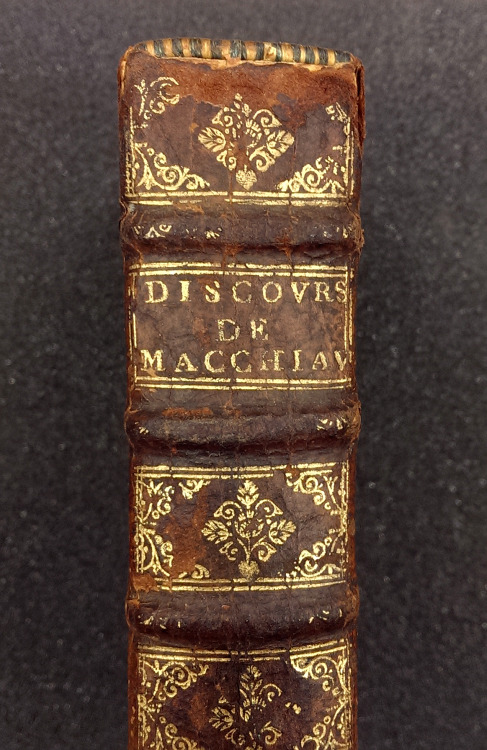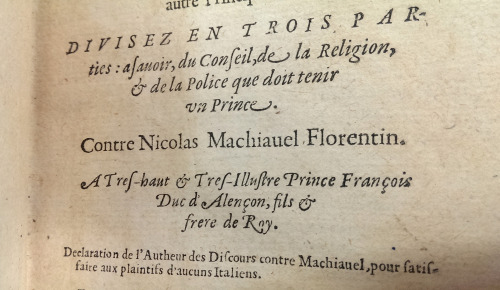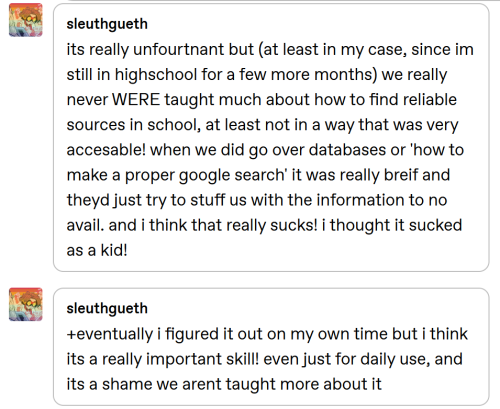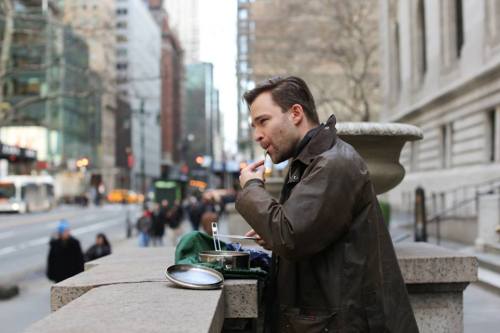#librarianship
In preparing for the purchase of another title by the Italian Renaissance philosopher, Niccolo Machiavelli, I found this sixteenth century rebuttal of the principles of Machiavelli by the French jurist Gentillet.
In his book, Discours sur les moyens de bien gouverner, Gentillet analyzes the character of a ruler, rights of parliament, and capacity of councilors among other traits of good statecraft. It is landmark book and quite uncommon, but what struck my eye immediately was the term “CONTREMACH:” boldly written on the top of the text block. At first glance I thought an owner of the book used the term for shelving purposes, but why write such an aid on the top of the text block where it is not readily seen? And more importantly, what does “contremach” mean?
After showing this to Andrew Lundeen, founder of the MSU Provenance Project, he quickly determined that the term “contremach” is really an abbreviated reference to the title (or shorthand name) of the work and was likely used for shelving purposes. That is to say, CONTREMACH:orCONTRE MACH: stands for “Contre [Against] Mach[iavelli].”
~Peter
This Provenance Project guest post was written by Peter Berg, Head of Special Collections and Associate Director for Special Collections & Preservation at Michigan State University.
——————–
Andrew’s note: This fascinating little volume illustrates a couple of interesting facts about working with old books. Firstly, we should never assume that a work only went by one title, or even that the full printed title of a book was the preferred nomenclature. Formal titles were often absurdly long-winded, and so abbreviated titles or referential names were frequently used in their place. This particular copy of Gentillet’s work, for example, bears three different names on the item itself: “Discours sur les moyens [etc.]…” on the printed title page, “Discours de Macchiav[elli]” on the spine, and “Contremach” or “Contre Mach” on the top edge of the text block (the abbreviation is taken from a portion of the work’s subtitle: “ContreNicolasMachiauel Florentin”).
This confusion about how to “properly” refer to the work can be seen in the various names of reprints and later editions as well. Here at MSU we have several versions of this work cataloged under different titles:
Discovrs svr les moyens [etc.]… — With the name copied directly from the title page of this 1579 printing (inc. the archaic use of “V”s for “U”s)
Discours contre Machiavel — The title of this 1974 updated edition
And finally, Anti-Machiavel — A 1968 printing that uses a historically common shorthand title for the work, one very similar to our CONTREMACH edgemark
Secondly, the placement of our CONTREMACH title indicates that this book may not have always been shelved in the way most modern readers and library-goers are familiar with—upright with its spine facing outward. The use of edge-marks such as this, as well as historical depictions of book collections in art, show that books were often stacked on top of one another with the edges of their text blocks visible.
Post link
ALA has not issued a press release about this (yet?), but it appears briefly in theAmerican Libraries coverage of the Council meeting.
CD #50, “Resolution on Renaming the Melvil Dewey Medal,” which came out of work done by the Feminist Task Force, has passed.
“A ‘Private’ Grievance against Dewey,” found in American Libraries over twenty years ago (Jan 1996, Vol. 27 Issue 1, p62-64), by WoLH profile subject Clare Beck, is among the sources listed.
Libraries and bookshops just have this…healing vibe to them. I can feel the books breathing and whispering. I feel still. The energy of the place just bathes the torn edges of my soul
Hey white librarians? Now is when we dig our heels in and speak loudly. Neutrality does not become us.
Black lives matter.
In addition to the great general resources, To Do lists, and donation suggestions, I highly recommend Disrupting Whiteness in Libraries: A Reading List from Karla Strand @gwslibrarian for profession-specific resources.
Also, at my institution, I’m using this scaffolded anti-racist resources document to work on a libguide in coordination with our diversity & inclusion committee activities.
Ah, geez, I had a feeling that was becoming the case in schools - you’re right, it’s not fair to you all! Information literacy is such an important skill, especially now with the deluge of information we encounter daily due to the internet.
My mom is an elementary school librarian and she teaches what she can, but based on what I’ve been hearing from her and seeing in general on the internet, I have a feeling things aren’t being taught as well as they should be, which makes me worried because this is a skill that can keep you all safe, too!
Here’s a few things I, a library professional, like to do that make the patrons think I’m some kind of research god because I’m so good at finding things. Now you too can astound people with your ability to locate information!
Booleans!I adore boolean operators. They make it a lot easier to narrow down information in a search engine. The three you really need to know are AND, OR, and NOT. You put your search terms themselves in quotation marks, especially if they’re multiple words long, and then use the booleans. To use an example that most people coming to my blog would be familiar with, let’s say you’re searching for Submas content, but you want it to be more specific. If we’re using Ingo and Emmet as the search terms, a boolean search to bring up both of them would look like “Ingo” AND “Emmet,” or “Ingo” OR “Emmet,” depending. If you wanted one or the other, put the one you’re looking for first, then NOT, and then the other one. Boolean operators are great when you’re trying to narrow down a search for more specific research. I can come up with extremely specific historical information from newspapers because I employ booleans.
You can use Wikipedia, despite what your teachers have to tell you sometimes: Just scroll to the bottom and see what the sources used to write the article were! You’ll get a bunch of sources you can use for whatever you’re writing, and if you have trouble accessing them at home, there’s a good chance you can access them at your library through a database.
Project Gutenberg, the Internet Archive/Wayback Machine, and Google Scholar are all free resources you can use. I love them all so much, even if my most frequent use of the Wayback Machine is to prove to people that there used to be a website called Hats of Meat. Project Gutenberg is a great place to find books in the public domain, and Google Scholar is excellent for accessing academic articles for free. Another excellent one your library might have access to is HathiTrust, which was getting started up when I was in library school. Their digitized book collection is outstanding. And I don’t think SciHub needs any introduction at this point!
Checking if a source is biased is a bit difficult in this day and age, but there’s always things that give it away. If the source is using inflammatory language or is clickbait-esque, there’s a good chance that source is trying to stir up people’s emotions in one direction or another. Finding a bunch of sources on the same topic from different viewpoints can actually help you look at an issue in ways you never have before. There’s a graph I keep on my phone to share with people that helps with evaluating the general leanings of common news sources:
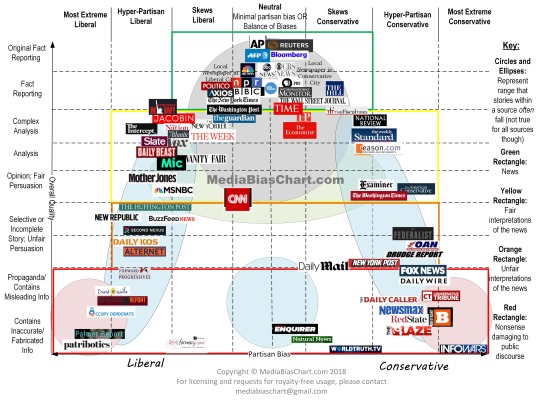
Obviously, this is a “your mileage may vary” graph, because a lot of these sources will have occasional guest pieces with different leanings, but this is overall a good basic guide. Academic sources are less likely to “have an agenda,” as they’re written for informational purposes, but studies are done to prove or dispute points, and they can also be twisted to someone’s narrative. (A good example is a recent study done proving autistic people are more likely to stick to their morals than neurotypical people, even if no one is watching; the people who published this study found a way to frame this negatively, because autism is still seen by many as a deficit.)
Definitely collect as many articles and sources on a topic as you can - one article alone is just one viewpoint, and if it’s not written in a neutral way, you need to see what everyone else is saying to form a sound opinion instead of just accepting the first thing you read - it might not be true, or it might be biased!
This is by no means an exhaustive guide, but if anyone needs help learning to research, this will hopefully be a good starting point for you!
Post link
“You want to photograph me eating chicken?”
“Yep.”
“Well, if I let you, I need you to help me deliver a message.”
“What’s that?”
“I work at this library. And before that, I was coming here for twenty years. It’s my favorite place in the world. As many people know, the main reading room of this library is supported by seven floors of books, which contain one of the greatest research collections in the world. Recently, the library administration has decided to rip out this collection, send the books to New Jersey, and use the space for a lending library. As part of the consolidation, they are going to close down the Mid-Manhattan Library Branch as well as the Science, Industry, and Business Library. When everything is finished, one of the greatest research libraries in the world will become a glorified internet cafe. Now read that back to me.”
It breaks my heart to see how quickly the good work of libraries the world over is being cast aside. Valuable, irreplaceable collections are being broken up to make way for more Starbucks-like spaces. I have no qualms about libraries providing coffee shops, and I am an avid user of electronic resources; what I fear is homogeneity. I fear that by the time we’ve replaced libraries with vast empty coffee shops that we’ll realise we haven’t created an information commons or an inspirational environment, but a noisy echoey draughty room which is no longer a palace of learning. Coffee shops are ten-a-penny. Great, inspiring, historic, and carefully curated collections which lead to serendipitous finding of ideas and knowledge are not. We owe it to future generations not to throw libraries away in exchange for the fleeting but empty reward of “being hip.”
Post link



